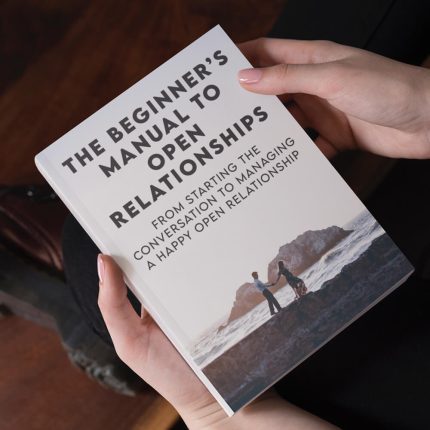Welcome, traditionalists and curious explorers alike! Whether you’ve been riding the monogamy train your whole life or you’re just now questioning if it’s really the only game in town, this guide is here to serve up a hearty helping of insight, humor, and a dash of irreverence. Get ready to dive into the world of monogamy—the long-standing relationship model that many swear by, yet still leaves room for plenty of questions, debates, and even a few plot twists. Useful Interruption: Not sure which relationship vibe fits you best? Take our Relationship Test, it’ll give you the real insight into your natural relationship style. Then, dive into our binge-worthy guides (from the tried-and-true to the “wait, that’s a thing?”) and find the perfect relationship type for your life: Now back to the main article but yeah take the test...
Understanding Monogamy: The One-Track Mind of Love
What Is Monogamy, Really?
Monogamy is the art of committing to one person at a time—a classic love blueprint that has defined relationships for centuries. It’s about focusing your emotional and romantic energy on a single partner, building a deep, exclusive bond, and, ideally, sharing a lifetime of adventures together. Think of it as investing all your favorite resources in one blockbuster movie instead of several indie films.
In a monogamous relationship, exclusivity is key. The idea is simple: one partner, one heart, one epic love story. Keywords like exclusive love, traditional relationship, and one true love are often used to describe this model. But as with any great script, there’s more beneath the surface than just “us against the world.”
Historical Context & Evolving Norms
Monogamy isn’t just a modern invention—it’s been a cultural staple for millennia. From ancient civilizations to modern society, the idea of pairing up for life has been celebrated, debated, and sometimes even enforced by law. Historically, monogamy was often linked with economic stability, social order, and the promise of a legacy. It’s the relationship model that many of our parents and grandparents grew up with, and it continues to hold a powerful cultural cachet.
However, as societal values shift and individualism takes center stage, many are rethinking what monogamy means for them. Recent studies, like one published in the Journal of Family Studies, show that while many still cherish monogamy, modern couples are also exploring ways to infuse it with greater flexibility, emotional depth, and even humor. In a world where every playlist is customizable, why should your love life be any different?
Models and Variations: More Than Just “Us”
The Many Faces of Monogamy
While monogamy is often seen as a one-size-fits-all solution, there are actually several flavors of it. Here are a few to consider:
- Traditional Monogamy: The classic model where two people commit exclusively to one another—think candlelit dinners, long walks on the beach, and sharing the last slice of pizza.
- Serial Monogamy: A pattern where individuals commit to one partner at a time, moving from one long-term relationship to the next over the course of their lives. It’s like enjoying a series of mini-seasons in your personal love saga.
- Romantic Monogamy: A twist on the classic form, emphasizing not only exclusivity but also the ongoing nurturing of romance and intimacy. It’s the belief that love should be an ever-evolving journey, not a static state.
No matter which variation resonates with you, the common thread is a focus on deep, lasting connection. Monogamy isn’t just about being with one person—it’s about growing together, sharing experiences, and, yes, even laughing at the quirks that make your relationship uniquely yours.
Monogamy vs. Other Relationship Models
In the grand relationship arena, monogamy often gets compared to other models like polyamory and open relationships. While each approach has its merits, monogamy stands out for its emphasis on exclusive partnership. Here’s a quick rundown:
- Monogamy: One partner, one heart, one ongoing adventure. It’s the model most of us are familiar with and many choose for its simplicity and intimacy.
- Polyamory: Multiple simultaneous romantic relationships, where emotional bonds are nurtured with several partners. Think of it as hosting a roundtable discussion instead of a one-on-one chat.
- Open Relationships: A hybrid model where partners remain committed but are free to explore additional emotional or sexual connections with others. It’s like having a side dish to your main course—but still savoring the primary flavor.
The key takeaway? Each model prioritizes honesty, communication, and trust—values that are essential whether you’re going solo or sharing your spotlight with others.
Communication and Boundaries in Monogamy: Keeping the Spark Alive
Talking It Out: The Heart of a Strong Connection
Even in a monogamous relationship, communication is the secret sauce that keeps everything running smoothly. Regular, heartfelt conversations help ensure that both partners feel heard, understood, and cherished. Whether you’re discussing future dreams or hashing out the mystery of who left the milk out, effective communication is essential.
Here are some tips for keeping the dialogue fresh:
- Schedule Regular Check-Ins: Think of it as a weekly tune-up for your relationship. Set aside time to talk about your feelings, plans, and even the little things that make you smile.
- Use “I” Statements: This helps keep the conversation non-confrontational. Instead of “You never listen,” try “I feel unheard when…”
- Keep it Light: Don’t be afraid to use humor to defuse tension. After all, laughter is often the best glue for a lasting bond.
Establishing Boundaries: The Invisible Rules of Engagement
While monogamy might seem straightforward, every relationship has its own set of boundaries. These are the unspoken rules that help both partners feel secure and respected. They might include how you handle time apart, personal space, and even expectations around social media (yes, that Instagram double-tap counts!).
Some boundary-setting tips include:
- Discuss Expectations Early: Don’t wait for a crisis to define your boundaries. Have those tough conversations upfront.
- Be Flexible: As you both grow, your needs may change. Regularly revisit and adjust your boundaries to keep them relevant.
- Respect Privacy: A little “me time” is healthy. Encourage each other to maintain personal interests and friendships.
Keywords like relationship communication and healthy boundaries are your best friends when it comes to maintaining a vibrant monogamous partnership.
Ethics, Consent, and Trust: The Bedrock of Monogamous Love
Consent: The Ultimate Relationship Pact
At the core of monogamy is the unspoken—and very real—commitment to consent. It’s not just about a one-time agreement; it’s an ongoing process of mutual understanding and respect. Think of it as the relationship contract that never really expires.
With consent as your foundation, trust blossoms naturally. It’s about always checking in with each other and ensuring that both partners are on the same page—whether that’s about finances, family planning, or deciding who gets the last slice of pizza.
Building Unshakeable Trust
Trust isn’t built overnight—it’s crafted through a series of small, meaningful actions. In a monogamous relationship, every honest conversation, every shared secret, and even every silly inside joke contributes to a strong bond. When trust is solid, even the occasional bump in the road feels like a minor detour rather than a dead end.
Experts say that couples who maintain consistent communication and celebrate small wins together report higher levels of satisfaction and connection. So, keep the trust train chugging along with daily affirmations, thoughtful gestures, and a commitment to always having each other’s backs.
Emotional and Psychological Dynamics in Monogamy
The Comfort of Consistency: Emotional Security in Monogamy
One of the greatest benefits of monogamy is the emotional security it can provide. When you commit to one person, you create a stable foundation where both partners can feel safe to be their authentic selves. That’s not to say there aren’t challenges—every relationship has its ups and downs—but the promise of a steady, reliable partner can be incredibly comforting.
This stability often leads to deeper emotional intimacy. Over time, sharing your daily triumphs, frustrations, and even the mundane details of life creates a bond that feels both timeless and transformative.
Growing Together: Personal Development Within a Monogamous Partnership
Monogamy isn’t just about maintaining the status quo—it’s a journey of mutual growth. As you navigate life’s twists and turns together, you learn more about yourself and each other. Whether it’s overcoming obstacles or celebrating milestones, every experience can contribute to personal and relational development.
In fact, research has shown that couples who actively support each other’s personal growth report higher levels of relationship satisfaction. So, be each other’s cheerleader, challenge each other to be better, and never stop learning—both about life and about love.
Challenges of Monogamy: Myths, Realities, and Opportunities for Growth
The Monogamy Myth: “One and Done” vs. Lifelong Commitment
There’s a common misconception that monogamy is about stagnation or that it’s only for the romantically naive. On the contrary, a thriving monogamous relationship can be a dynamic, evolving partnership full of surprises, challenges, and endless opportunities for growth.
Like any great adventure, monogamy has its share of plot twists—moments of doubt, unexpected challenges, and times when the routine might feel a little too routine. But these moments are opportunities in disguise: chances to reconnect, reinvent, and rediscover the reasons you fell in love in the first place.
Handling the “Grass is Greener” Syndrome
Even in the most committed relationships, it’s normal to wonder, “What if?” The key is not to let these thoughts undermine your bond. Instead, use them as a catalyst for deeper communication and renewed commitment. When the temptation of “the other option” looms, remind yourself of the unique journey you share with your partner—a journey built on shared memories, inside jokes, and the comfort of knowing someone truly gets you.
Monogamy in the Digital Age: Love, Tech, and Social Media
Staying Connected in a Hyper-Connected World
In today’s fast-paced digital landscape, staying connected with your partner can be both easier and more challenging than ever. Social media, texting, and video calls offer endless ways to communicate—but they can also introduce new complexities, like comparing your relationship to the highlight reels of others.
The trick is to use technology to your advantage: send a funny meme to brighten your partner’s day, schedule virtual dates if you’re apart, and always remember that what you see online is just a snapshot, not the full story. Balancing digital connection with real-life quality time is key.
The Role of Dating Apps and Online Communities
Even if you’re happily monogamous, exploring online communities and dating apps can offer fresh perspectives on love and commitment. Many platforms now celebrate all kinds of relationships—including monogamy—and provide forums for discussion, advice, and even a few laughs about the trials and tribulations of modern love.
Engaging with these communities can help you understand the evolving landscape of relationships, compare notes with others, and sometimes even find innovative ways to keep the spark alive in your own partnership.
Global Perspectives: Monogamy Around the World
Different Cultures, Different Love Stories
Monogamy might be a global norm, but its practice and cultural significance vary widely. In some cultures, monogamy is intertwined with tradition, religion, and family honor, while in others it’s seen as just one of many valid ways to form a relationship.
Understanding these global perspectives can broaden your view of love and commitment. It reminds us that while the core values of trust, loyalty, and communication remain universal, the ways in which people express and experience monogamy can be as diverse as the colors of a sunset.
The Future of Monogamy: Trends and Transformations
As society evolves, so too does the institution of monogamy. Many couples are redefining what exclusivity means in a modern context—infusing it with more flexibility, emotional openness, and even a touch of renegade humor. Whether it’s through embracing technology, experimenting with new traditions, or simply rethinking old rules, the future of monogamy is as dynamic as it is promising.
Experts predict that monogamy will continue to be a cornerstone of many relationships, but with a modern twist that values both tradition and transformation. After all, love is never static—it’s a living, breathing journey.
EXPLORE OUR ETHICAL NON-MONOGAMY & OPEN RELATIONSHIP SHOP
👨💻👩💻 Digital Store (Instant Download)
🍆💦 Clothing Store (Worldwide Delivery Available)
It's Not Cheating If He Watches T-Shirt (Black)
$29.99I Love Watching Pop Art T-Shirt (Black)
$29.99Real Men Share Pop Art T-Shirt (White)
$29.99Real Men Share Pop Art T-Shirt (Black)
$29.99Three Isn't a Crowd Unisex T-Shirt (Black)
$29.99I Love Watching Pop Art T-Shirt (White)
$29.99Fuck Each Other Not The Planet Unisex T-Shirt (White)
$29.99Multiple Lovers - Sharing Is Caring Unisex T-Shirt (Black)
$29.99Sharing Is Caring Unisex T-Shirt (Black)
$29.99Sharing Is Caring Daddy Cap (Black)
$39.99Fuck Each Other Not The Planet Unisex T-Shirt (Black)
$29.99Three Isn't a Crowd Unisex T-Shirt (White)
$29.99Research, Data, and Expert Insights on Monogamy
What the Numbers Say
Data shows that monogamous relationships, when nurtured with care, offer substantial emotional benefits. A study by the Relationship Research Foundation revealed that couples who invest in exclusive partnerships often experience:
- Increased emotional security and stability
- Higher relationship satisfaction and well-being
- A deeper sense of trust and commitment
These statistics aren’t just numbers—they’re a testament to the enduring power of a well-tended monogamous relationship.
Insights from Relationship Experts
We reached out to some of the brightest minds in the relationship world, and here’s what they had to say:
- Dr. Emily Heart, Love Scientist: “Monogamy, when approached with intentionality and open communication, can be a powerful foundation for personal growth and mutual support. It’s not about limiting your love; it’s about deepening it.”
- Mark “The Bond” Johnson, Relationship Coach: “There’s a beauty in knowing that you’ve chosen one person to be your partner in crime. It’s a commitment that, when nurtured, brings a lifetime of shared adventures and endless inside jokes.”
Their insights remind us that while monogamy may seem traditional, it’s anything but boring when both partners commit to growth, honesty, and a little bit of fun along the way.
FAQ: Your Burning Questions About Monogamy
1. What exactly is monogamy?
Monogamy is the practice of forming a relationship with one person at a time. It’s all about committing exclusively to one partner, building a deep, enduring connection, and investing your heart, mind, and soul into that one love story.
2. Why do people choose monogamy?
Many choose monogamy for its promise of emotional security, stability, and deep intimacy. It offers a clear framework for building trust and a shared future, which can be incredibly comforting in an ever-changing world.
3. Is monogamy outdated?
Not at all! While society is exploring a range of relationship models, monogamy remains a popular choice for many due to its focus on exclusive commitment and long-term growth. It’s evolving with modern values, proving that tradition can be both timeless and adaptable.
4. Can monogamy be exciting?
Absolutely! A well-nurtured monogamous relationship is like a long-running TV series with ever-evolving characters, plot twists, and plenty of humor. The key is keeping communication alive and continuously investing in your connection.
5. How do I keep my monogamous relationship fresh?
Keep the spark alive by scheduling regular date nights, trying new activities together, and never underestimating the power of a shared laugh. Communication, curiosity, and a willingness to grow together are your best tools.
6. What are the biggest challenges in monogamy?
Common challenges include maintaining passion over time, dealing with external temptations, and managing everyday conflicts. The trick is to address these issues head-on with honesty, humor, and mutual support.
7. How do I handle disagreements in a monogamous relationship?
Disagreements are normal—what matters is how you resolve them. Practice active listening, use “I” statements to express your feelings, and always be willing to compromise. Think of conflict resolution as a dance where both partners learn to move in sync.
8. Is it possible to rebuild trust if it’s been broken?
Yes, though it takes time, patience, and genuine effort from both partners. Open communication, counseling, and a commitment to transparency are key to rebuilding that foundational trust.
9. How do I talk to friends and family about my commitment to monogamy?
Share your story with pride and honesty. Explain that monogamy is your chosen path for building a deep, lasting connection. A little humor can help, too—after all, who wouldn’t appreciate a good tale of two people navigating life’s ups and downs together?
10. What should I do if I start doubting monogamy?
It’s normal to question your choices from time to time. Reflect on your feelings, have an honest conversation with your partner, and consider seeking advice from a trusted friend or professional. Remember, growth often comes from questioning and then reaffirming what truly matters to you.
Resources and Community Support: Your Guide to Thriving in Monogamy
Top Books, Podcasts, and Blogs on Monogamy
Whether you’re a seasoned monogamist or just exploring the concept, these resources offer wisdom, practical advice, and a good dose of humor:
- "Committed: A Skeptic Makes Peace with Marriage" by Elizabeth Gilbert – A candid look at the ups and downs of monogamous commitment.
- "The Seven Principles for Making Marriage Work" by John Gottman – Expert advice on building a strong, lasting bond.
- Podcasts: "Where Should We Begin?" by Esther Perel and "Modern Love" provide real-life stories and expert insights on the intricacies of love and commitment.
- Blogs & Online Communities: Check out forums like r/relationships and dedicated monogamy groups on Facebook for lively discussions and supportive advice.
Finding Professional Support and Peer Networks
Sometimes, a little guidance can make a world of difference. Whether it’s a relationship coach, a therapist specializing in couples counseling, or a supportive online community, don’t hesitate to seek out help when needed. These resources can provide personalized advice and a fresh perspective, ensuring that your monogamous journey is as enriching as it is enduring.
Remember, every relationship is a work in progress. With the right mix of commitment, communication, and a pinch of humor, you can create a monogamous love story that’s uniquely yours.





















